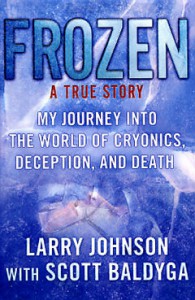Seriously, Read a Book!
Thoughts on books, often interpreted through the high-brow prism of cartoon (read: Archer) references. Wait! I had something for this...
Currently reading
Frozen: My Journey into the World of Cryonics, Deception, and Death

People are weird about death…which, I suppose, means that being ‘weird about death’ is actually quite normal. So, in some ways, having people dole out money to have their bodies frozen on the off chance that future technology will be able to resurrect them in a couple of decades isn't all that different from your workaday televangelist imploring ‘true believers’ to send in checks in order to ensure their place in a city in the sky. Author Larry Johnson's exposé isn't a condemnation of the concept of cryonics, or the viability of the science – it's about the bizarre (and often times super shady) inner workings he observed while working at the Alcor Life Extension Foundation.
The semi-journalistic aim of this book felt like sort of a mashup of The Genius Factory: The Curious History of the Nobel Prize Sperm Bank, and Going Clear: Scientology, Hollywood, and the Prison of Belief (both of which I happened to read earlier this year). However, in style and content, it was inferior to each and/or both—and this is the reason for my 2.5/5 star rating.
Why tell you this at all? Well, because there's quite a bit of controversy around the legitimacy of the book, its author, the criminal allegations…the list goes on. However, not being an expert myself, and feeling insufficiently interested to dig deeper into the book's veracity, I'm not equipped to give this truthiness score.* Long of the short is that this is a he-said/she-said corporate whistleblower case with the added allure of celebrity affiliation (primarily Ted Williams, but there are others to be sure).
Of Anesthetic Drugs & Butt Plugs
Larry, a veteran paramedic wasn't a delicate flower when it came to the death business. He'd spent the last several years on-call in Vegas (where insanity often reigns), and was even on-hand as a chopper paramedic for the Branch Davidian debacle in Waco. And yet, pretty much from day one he was a bit surprised at what he found kicking around the Alcor compound.
In addition to the expired paralytic drugs (why would you need to paralyze a dead person?), the butt plugs (umm...maybe those come in handy), and a diaspora of pizza boxes and tuna cans (turns out tuna cans make excellent pedestals for frozen human heads), the cast of characters he met seemed a bit off.† Examples?
- A woman who wears a bicycle helmet while in her car to protect her brain (not exactly sound science there)
- A CEO (Larry Johnson) and COO (Charles Platt) constantly sniping at one another (in battles dubbed ‘cryowars’ by Alcor staffers) via company-wide emails
- Oh, and a lurking hunchbacked computer scientist who inspired the observation made by Charles Platt below
“I suppose the most curious thing about Michael Perry,” Charles continued, “is that he removed his own testicles with a razor blade.”
For my money, the most egregious things Larry observes deal with bad lab protocol (e.g. removing Ted Williams' head when he was supposed to be a full-body patient), and the kind of gross environmental and worker-safety negligence that occur when an industry lacks any form of oversight (e.g. if a body pretty much decays in a van, you shouldn't just hose the thing out before returning it to the car rental company).
Yes, referring to death as the end of a patient's “first lifecycle” is a little odd, and helping a patient to reach that end point is (in most states) illegal, but it also doesn't sound like that was the norm. Threatening Johnson's life is definitely not cool, but there's just not much to say about that.
As far as Ted Williams goes, it sounds like Alcor (at most) aided and abetted Williams' greedy scoundrel of a son, John Henry Williams. I haven't been able to find the full-length piece on this that Johnson wrote for Sports Illustrated in 2003 (you can get the gist from ESPN's coverage of the saga), but what likely made for a fascinating magazine article was just too drawn out in book form.
______________________________________________
* So, if all that death threat business from the cryo-fanatical fringe turns out to be true, feel free to just blame Larry.
† As for the obvious questions as to why Larry wouldn't make an immediate b-line for the exit, he chalks this up to being a bit of an adrenaline junkie. But, yes, I too was confused about this aspect of Larry's tale.
 2
2












